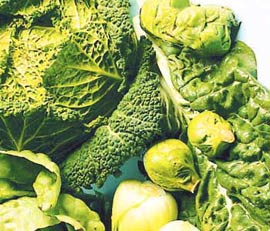Folic acid may help prevent cleft lip and cleft palate
According to a recent study, women who take folic acid supplements early in pregnancy can significantly reduce the risk of having a baby with wide mouth defects.
Researchers from the National Institute of Health and Environment Science (NIEHS), of the National Institutes of Health, found that pregnant women taking 0.4 milligrams of folic acid a day would help reduce the risk of having a baby with a jaw lips (with or without cleft palate). Folic acid is a B vitamin found in leafy vegetables, sour fruits (citrus, lemon, grapefruit), beans, whole grains. Folic acid can be used as a supplement, and added to powder or other foods fortified with supplements. The recommended dose of folate in the daily diet for adults is 400 micrograms or 0.4 mg.
This new study has been published online in the British Medical Journal. Dr. Allen J. Wilcox, Ph.D., head of the NIEHS study, said: 'This new finding provides additional evidence for the benefits of folic acid for women. We already know that folic acid helps reduce the risk of neural tube defects, including spina bifida. The results of our study found that folic acid also helps prevent wide mouth defect, which is one of the common birth defects. ' In the United States alone, about 1 in 750 babies is born with cleft lip and / or cleft palate.

Folic acid-rich food (Photo: theage)
Dr. Wilcox adds: 'One of our key hypotheses is that folic acid deficiency causes lab animals with wide mouth defects; so we have a good reason to focus on folic acid in this study. '
The researchers looked at the association between broad mouth defects and the amount of folic acid supplement, multivitamins, and folate in mothers' diets. They found that adding 400 micrograms (or more) of folic acid a day would reduce the risk of cleft palate with or without cleft palate by about a third, but had no obvious effect on reducing risk of cleft palate.
Dr. David A. Schwartz, director of NIEHS, said: 'It is clear that maternal nutrition during pregnancy is an external factor that can affect fetal health.' NIEHS researchers are continuing to analyze the data to find evidence of other environmental factors that increase the risk of wide mouth defects.
The study was conducted on the basis of people in Norway, one of the countries with the highest rate of mouth ulcers in Europe, and the country that does not allow the addition of folic acid to food. Researchers contacted all families with babies with wide mouth defects [cleft palate with or without cleft palate (CLP) or just cleft palate (CPO) born around the time 1996-2001 period. The study included 377 children with CPL and 196 with CLO disabilities as well as 763 randomly selected children from births in Norway.
The researchers sent questionnaires to each of the mothers involved in the study. The first questionnaire is sent as soon as the mother gives birth and focuses primarily on general health information such as number of people, birth process, and information about external effects including tobacco , alcohol and vitamins: the second questionnaire focuses on nutrition and diet in pregnancy. Mothers who reported taking folic acid supplements and / or vitamins were required to send the used vial or drug label used to determine the dose. Nutrition questionnaires include questions about mothers' fruit and vegetable use during the first three months of pregnancy.
Researchers have estimated that 22% of cleft palate (CLP) in Norway can be prevented if all pregnant women take 0.4 mg of folic acid daily.
Hong Linh
- What is folic acid and in what food?
- New hydrogen material helps treat cleft palate
- Lack of folic acid can cause depression
- VN: nearly 2,000 newborn babies suffer from cleft lip and palate every year
- Use folic acid with vitamin B12 to cause cancer
- Taking plenty of folic acid is easy to give birth to, sometimes, IVF
- Folic acid can detoxify arsenic in the blood
- When to iron and folic acid?
- Vitamins help reduce the risk of infertility
- The diet of pregnant women increases the risk of asthma in children
- Mexico successfully bred a new variety of beans rich in folic acid
- Eating supplements against cancer
 Green tea cleans teeth better than mouthwash?
Green tea cleans teeth better than mouthwash? Death kiss: This is why you should not let anyone kiss your baby's lips
Death kiss: This is why you should not let anyone kiss your baby's lips What is salmonellosis?
What is salmonellosis? Caution should be exercised when using aloe vera through eating and drinking
Caution should be exercised when using aloe vera through eating and drinking